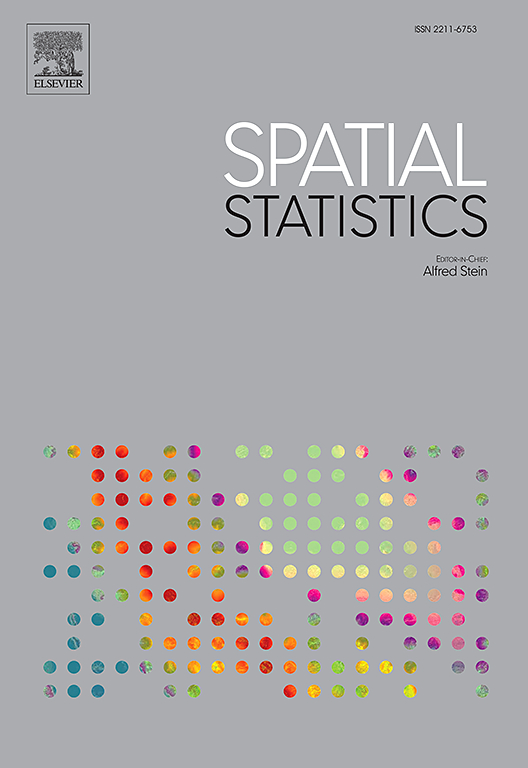Joint spatial modeling of mean and non-homogeneous variance combining semiparametric SAR and GAMLSS models for hedonic prices
IF 2.5
2区 数学
Q3 GEOSCIENCES, MULTIDISCIPLINARY
引用次数: 0
Abstract
In the context of spatial econometrics, it is very useful to have methodologies that allow modeling the spatial dependence of the observed variables and obtaining more precise predictions of both the mean and the variability of the response variable, something very useful in territorial planning and public policies. This paper proposes a new methodology that jointly models the mean and the variance. Also, it allows to model the spatial dependence of the dependent variable as a function of covariates and to model the semiparametric effects in both models. The algorithms developed are based on generalized additive models that allow the inclusion of non-parametric terms in both the mean and the variance, maintaining the traditional theoretical framework of spatial regression. The theoretical developments of the estimation of this model are carried out, obtaining desirable statistical properties in the estimators. A simulation study is developed to verify that the proposed method has a remarkable predictive capacity in terms of the mean square error and shows a notable improvement in the estimation of the spatial autoregressive parameter, compared to other traditional methods and some recent developments. The model is also tested on data from the construction of a hedonic price model for the city of Bogotá, highlighting as the main result the ability to model the variability of housing prices, and the wealth in the analysis obtained.
结合半参数 SAR 模型和 GAMLSS 模型为对冲价格建立均值和非均质方差的联合空间模型
在空间计量经济学中,有一种方法可以对观测变量的空间依赖性进行建模,并对响应变量的均值和变异性进行更精确的预测,这对领土规划和公共政策非常有用。本文提出了一种联合模拟均值和方差的新方法。此外,它还可以将因变量的空间依赖性作为协变量的函数进行建模,并在两个模型中对半参数效应进行建模。所开发的算法基于广义加法模型,允许在均值和方差中包含非参数项,保持了空间回归的传统理论框架。对该模型的估计进行了理论开发,在估计器中获得了理想的统计特性。通过模拟研究,验证了所提出的方法在均方误差方面具有显著的预测能力,与其他传统方法和一些最新方法相比,在空间自回归参数估计方面有明显改善。该模型还对波哥大市构建保值价格模型的数据进行了测试,其主要结果是突出了对住房价格变化的建模能力,以及所获分析的丰富性。
本文章由计算机程序翻译,如有差异,请以英文原文为准。
求助全文
约1分钟内获得全文
求助全文
来源期刊

Spatial Statistics
GEOSCIENCES, MULTIDISCIPLINARY-MATHEMATICS, INTERDISCIPLINARY APPLICATIONS
CiteScore
4.00
自引率
21.70%
发文量
89
审稿时长
55 days
期刊介绍:
Spatial Statistics publishes articles on the theory and application of spatial and spatio-temporal statistics. It favours manuscripts that present theory generated by new applications, or in which new theory is applied to an important practical case. A purely theoretical study will only rarely be accepted. Pure case studies without methodological development are not acceptable for publication.
Spatial statistics concerns the quantitative analysis of spatial and spatio-temporal data, including their statistical dependencies, accuracy and uncertainties. Methodology for spatial statistics is typically found in probability theory, stochastic modelling and mathematical statistics as well as in information science. Spatial statistics is used in mapping, assessing spatial data quality, sampling design optimisation, modelling of dependence structures, and drawing of valid inference from a limited set of spatio-temporal data.
 求助内容:
求助内容: 应助结果提醒方式:
应助结果提醒方式:


